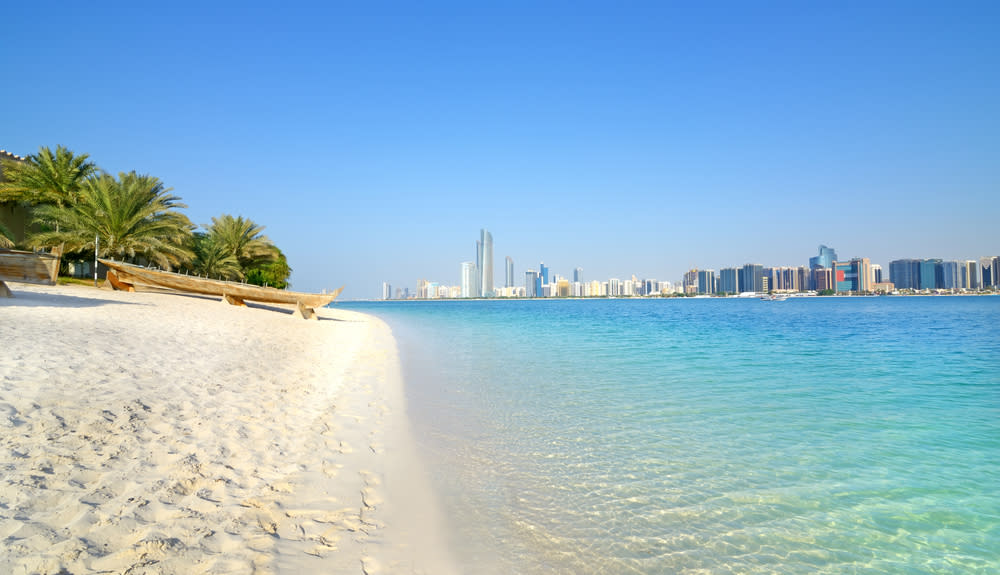More from Abu Dhabi
Main Menu
- 00:00
- 06:00
- 12:00
- 18:00
- 23:00
Abu Dhabi : Next 24-Hour Weather
Today - 7th July 2025
Sunrise 05:39
Sunset 19:14
Tomorrow - 8th July 2025
Sunrise 05:39
Sunset 19:14
Holiday Weather Now
Sorted by popularity:
Updated at 10:00 GMT
-
Temp feels like41°C106°F
-
Length of day13h 35m
-
Pressure29" (996 hpa)
-
Visibility10 km (6miles)
-
Wind speed20 km/h
Sunrise 05:39
Sunset 19:14
-
Temp feels like:
41ºC (106 ºF)
-
Length of day:
13h 35m
-
Pressure:
29" (996 hpa)
-
Visibility:
6 miles (10 km)
-
Wind speed:
20 km/h
Weather Abu Dhabi
Abu Dhabi is the capital of the United Arab Emirates and the second largest city in the U.A.E. behind Dubai. The U.A.E. makes up a small portion of the Arabian Peninsula and shares its southwestern border with Saudi Arabia. Abu Dhabi is actually an island in northern U.A.E., in the southern end of the Persian Gulf, and is joined to the mainland by a few bridges. There are many other small islands surrounding Abu Dhabi.
Abu Dhabi has a very hot desert climate surrounded by sand and water. There are some mountains a distance from Abu Dhabi but they don't generally influence Abu Dhabi's climate. Abu Dhabi is just a little hotter and drier than Riyadh, which lies at roughly the same latitude.
Abu Dhabi's annual averages don't fluctuate much between hot and cold, really just between hot and hotter. Rain is rare. Because of these factors Abu Dhabi's seasons are only split between the hot season and the cooler season.
The hot season in Abu Dhabi generally ranges from April to October. Rain is rare, and temperatures and humidity can be unbearable for many people. The cooler season from November to March has milder temperatures and more comfortable humidity levels. Rain during this time is still only between 10-20mm each month.
The best time to visit Abu Dhabi depends on if you're looking for cheap prices or comfortable temperatures. The shoulder seasons of April-May and September-October have the cheapest flights and hotels but they're hotter and more humid.
The middle of the cooler season December through February has much more comfortable weather for most people.
Hot Season Weather in Abu Dhabi
The hottest month in Abu Dhabi is August. The average daytime high in Abu Dhabi in August is 42°C. The hottest day ever recorded in Abu Dhabi was in August when the temperature reached 49.2°C. Even the shoulder months are warm, with average daytime highs of 27°C in April and 29°C in October. Nights only cool down to an average of 29°C in August.
During some of the summer months the chances of precipitation are zero percent. The skies are overcast almost half of the time in the middle of summer but the clouds don't produce any rain. Abu Dhabi will often go months in the hot season without receiving any measureable precipitation.
If you do visit Abu Dhabi during the hot season, you'll want to temper your wardrobe selection with local customs. Police are given the authority to enforce the dress code and you'll want to make sure that you comply. Women must cover everything from their shoulders to their knees. Exposing the arms is okay.
Men traditionally always wear long pants, saving shorts for the beach or exercise. Don't wear any tight-fitting clothing. You'll be much more comfortable in light-colored and lightweight clothing made of cotton and linen.
Most tourists spend summers in Abu Dhabi in the water, in shopping malls, or inside the prevalent air-conditioned hotels. Even the water temperatures climb up to 33°C in the hot season.
Extreme Weather
Sandstorms aren't the apocalyptic storms that Hollywood makes them out to be, but they do still occur in the summer. They're not disastrous but they can reduce visibility and lightly coat everything with sand.
Average temperatures have also been on the rise in recent years. Locals have done well to acclimatize to the hot weather, as they've done for thousands of years. It's a source of pride for them, but can be dangerous for tourists not used to it. Use caution when exerting yourself outdoors.
Cooler Season Weather in Abu Dhabi
The cool season in Abu Dhabi is characterized by slightly more rain, cooler days, cooler nights, and cooler seas. The skies are often sunny and bright too, compared to the haze and overcast that can settle in during the summer.
The average temperature in January is 18°C, with days reaching 24°C and nights cooling down to 12°C. The lowest temperature ever recorded in Abu Dhabi was in January, at 5°C. The record high for January was 33.7°C.
The rains usually occur late in the cool season, with 75% of Abu Dhabi's total annual precipitation occurring between February and March. The annual total is around 90mm, so this won't be much rain.
The cool season is the best time for outdoor activities in Abu Dhabi. There are a number of fun things to do in the sand dunes, like riding dune buggies and camels. There are kayaking tours to take through the mangroves and plenty of beautiful walks to take on land. All of these activities will be more enjoyable in the cool season.
Extreme Weather
Abu Dhabi isn't prepared for massive rainfall because of the lack of average precipitation. Some years, however, Abu Dhabi is under water from immense rain. A storm in March 2016 was one of the worst in recent times. Winds reached hurricane-force at a recorded 126 km/h. This storm dumped 295mm of rain in four days over 300% of their annual average in just a few days. Businesses and schools were shut down for days.

















